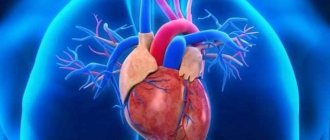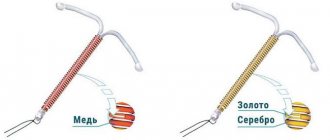Hormonal changes after medical abortion
The content of the article
In cases where a woman does not want to continue her pregnancy, she is offered to resort to medical abortion for up to 6 weeks from the moment of conception (42 days from the date of the last menstruation). At this stage, the fertilized egg is barely established in the endometrium and is poorly attached to the uterus. In addition, significant hormonal changes in the body have not yet occurred, and it will be easier for a woman to endure the consequences of an abortion.
Abortion medications are not hormonal, but directly affect the entire hormonal system.
- Medicines used for medical abortion are based on the action of the drug Mifepristone, a synthetic steroid drug that blocks progesterone receptors. 200 mg of Mifepristone causes a sharp drop in the level of progesterone, which is responsible for maintaining pregnancy. The endometrium grows, and the fertilized egg loses contact with the uterus.
- After a certain time (1-1.5 days), the patient takes Mifegin, a synthetic analogue of prostaglandins, physically active substances that cause uterine contractions. The fertilized egg is expelled from the uterine cavity. A few days later, the patient comes for a control ultrasound to make sure there is no pregnancy. If it persists, then it is all the more necessary to have an abortion, because sudden hormonal changes have an extremely negative effect on the embryo. However, the effectiveness of medical abortion is 98%, and surgical intervention is extremely rarely resorted to.
Normally, the patient’s hormonal levels are restored during the cycle. Ovulation is restored within a month. However, hormonal imbalance is quite possible, because steroid drugs affect the entire body.
Consequences of medical abortion:
- Pressure surges, general deterioration in well-being (prostaglandins contribute to the contraction of not only the muscles of the uterus, but also the blood vessels, as a result they contract, and a decrease or increase in pressure occurs).
- Tachycardia occurs, the pulse quickens (this is the effect of prostaglandins on the heart muscle);
- Chronic bronchitis/bronchial asthma worsens (prostaglandins relax the smooth muscles of bronchioles and cause bronchoconstriction);
- An overdose of Mifepristone causes uterine bleeding;
- Medical abortion at more than 6 weeks of pregnancy leads to incomplete abortion and preservation of the ovum;
- Digestive problems worsen in patients with stomach diseases
In general, medical abortion does not have serious side effects. They occur in two cases: with incorrect dosage and violation of the dosage regimen, as well as when using the drug more than once a year.
Myths about OK
There is a myth among women that taking medications can cause problems in the body’s functioning: weight gain, skin rashes, increased blood pressure. But such a reaction can only occur if the drug is chosen incorrectly.
Also, the doctor must take into account the medical history and select the drug taking into account certain factors - age, pregnancy and existing diseases. In the last century, contraceptives were indeed prescribed, which contained male sex hormones. This was the first generation of contraception - the only pills available at that time. Women who took them could become overweight, have increased body hair growth, and deepen their voices.
On the other hand, the selection of drugs is always individual and one must focus on the body’s reaction in each specific case. If complaints arise, the appointment can always be adjusted. With the use of the latest generation of OCs, there are practically no problems with weight: in rare cases, a woman can gain 1-2 kg. But dietary recommendations must always be followed, not only when taking medications.
Vacuum abortion. Hormonal changes
Vacuum abortion or vacuum aspiration is carried out up to 7 weeks of pregnancy and consists of artificially terminating pregnancy by sucking out the fertilized egg using a vacuum pump. The procedure does not require dilation of the cervix, and the separation of the fertilized egg does not occur surgically, but spontaneously under pressure.
Despite a relatively gentle method of terminating pregnancy, vacuum aspiration also leads to hormonal imbalance. This is especially true for young (teenagers) and women who have never given birth before.
The menstrual cycle after the procedure is more difficult to restore than in the case of medical abortion. For 10 days after vacuum aspiration, the woman observes bleeding, but there is no talk of full menstruation. Normally, the first menstruation after the procedure occurs within 30-50 days. But for complete restoration of the pelvic organs, time must pass. In women who have previously given birth, the reproductive system turns on after 3-4 months, in women who have not previously given birth - after six months. Although the chance of getting pregnant remains high, therefore after a vacuum abortion you need to protect yourself for some time with condoms.
In most cases, the doctor prescribes hormonal contraceptives to the woman after vacuum aspiration, so that a sharp drop in the level of progesterone and estrogen does not cause the development of tumors. The fact is that during pregnancy the level of hormones increased evenly. Then the fertilized egg was removed, but the female body has an adaptation system.
The body experiences extreme stress during an abortion. The hypothalamus is still excited, it does not have time to rebuild, so the pituitary gland actively produces prostaglandins. For this reason, the ratio of FSH and LH is disrupted. Increased secretion of follicle-stimulating hormone leads to an increase in the size of the ovaries, which secrete estrogen above normal. The increase in luteotropic hormone activates the adrenal glands, which produce glucocorticosteroids.
Due to the increased activity of hormones, without special therapy, a woman may develop the following diseases:
- polycystic ovary syndrome;
- endometriosis;
- lack of luteinized hormone;
- uterine fibroids;
- anovulation (ovarian failure);
- endometrial polyps.
The only way to avoid the consequences of hormonal imbalance after an abortion is close cooperation between the patient and the doctor.
What to do if you need to stop using contraceptives?
According to the recommendations of all gynecologists and manufacturers of hormonal drugs, they should be discontinued after the pack has been completely consumed. Only in this case can you avoid hormonal imbalance, which is sure to happen otherwise. After taking the last tablet from the pack, menstrual-like bleeding begins.
It is also called a withdrawal reaction. Typically, such menstruation begins 1-2 days after finishing taking the pills. To make this process go as smoothly as possible, you must adhere to the following recommendations:
- Before stopping oral contraceptives, you should definitely consult with your gynecologist. In some cases, stopping these medications is strictly prohibited.
- It is recommended to undergo tests to determine the level of sex hormones.
- If possible, you should drink the entire pack to the end. Interrupting the use of oral contraceptives in the middle of the cycle leads to serious consequences for the body. In this case, the woman’s reproductive system will experience enormous stress and react with intense uterine bleeding.
Surgical abortion. Hormonal changes
Surgical abortion is performed before the 12th week of pregnancy and is the most traumatic among all types of abortion. The endocrine system is especially affected. By the 11th, the concentration of human chorionic gonadotropin reaches its peak, so abortion causes its sharp drop.
The hormonal system is under extreme stress. The corpus luteum does not dissolve for a long time, and the body remains for a long time in a state similar to that which occurs before ovulation. For this reason, menstruation after an abortion occurs very late, sometimes only after hormonal therapy.
Contraindications to taking OK
- Liver failure
- Kidney failure
- Tendency to thrombosis
- Oncological diseases (any location)
Every woman should know: in order to eliminate undesirable consequences for the body, it is necessary to consult a specialist and follow a number of simple rules. The choice of contraceptive method should always primarily depend on the individual characteristics and health status of the patient.
Using oral contraceptives to protect against unplanned pregnancy is very convenient, take the pill and forget, but there are situations when a woman urgently needs to stop using the drug, and in order to avoid the development of negative reactions, this must be done correctly.
Hormonal disorders after abortion: what will happen if left untreated
Despite the difficult recovery, 40% of women in Russia consider artificial termination of pregnancy an acceptable method of pregnancy planning. Various complications slow down the normalization of hormonal levels. In addition to contraceptives, the woman takes medications and antibacterial drugs. The body works in stress mode, for this reason recovery is quite slow.
At the same time, the recovery period after an abortion is extremely important. If no action is taken, abortion has serious consequences. These include:
- uterine bleeding;
- slowing down proliferation (recovery of damaged tissue);
- inflammation and damage to the endometrium;
- increased excitability of the hypothalamic-pituitary system;
- deficiency of estrogen and progesterone;
- perforation of the uterus.
40% of the causes of infertility in women are the consequences of abortion, in particular, illiterate restoration.
How hormones affect the female body
The female reproductive system is very harmonious. By taking oral contraceptives, we disrupt the natural course of events to achieve the goal we need. How does this happen?
The ovaries stop working at full capacity, falling into “sleep mode,” as it were. The mucus of the cervical canal thickens, preventing sperm from moving forward. The thickness of the endometrium (the layer of the uterus where the embryo attaches) decreases, preventing the embryo from attaching. Due to the combination of all factors, conception becomes almost impossible.
Consequences of abortion: how to restore hormonal levels
An abortion performed in a medical facility is always accompanied by measures aimed at minimizing the consequences of the intervention. The doctor observes the woman immediately after the procedure, as well as for 1-3 months after. He prescribes medications that have a positive effect on the endocrine and reproductive systems.
The most effective method of restoring hormonal levels after an abortion is taking combined oral contraceptives (COCs). Low-dose monophasic drugs are recommended by WHO not only for the prevention of infections and inflammations, but also to prevent new unwanted pregnancies.
In a young healthy woman with a favorable outcome of abortion, the next ovulation occurs 10-11 days after termination of pregnancy. Therefore, progestin analogues (steroidal female sex hormones) should be started on the 1st day after surgery, take a 21-day course, take a week's break and again take the COC for a 21-day course. If there is a risk of infection, the patient simultaneously takes antibiotics of a different spectrum. The maximum course of hormonal therapy is 3 months.
Combined contraceptives, in addition to restoring hormonal levels, stop and prevent inflammatory processes in the uterus and ovaries. Medical abortion can cause severe uterine bleeding. Under the influence of Mefipristone, the tone of the uterus weakens, and the production of cortisol, which is responsible for the contraction of blood vessels, is blocked. This causes severe bleeding, a decrease in the body's defenses, loss of strength, etc. The uterus contracts poorly, which causes spasm of the cervix, and blood is retained inside, causing inflammation. Thanks to PDA, the walls of blood vessels are strengthened, the uterine muscle becomes elastic, and the volume of outgoing blood decreases. Due to this, the cervical canal narrows and uterine bleeding is reduced.
After expulsion of the fertilized egg, even with medical abortion, a wound remains on the inner surface of the uterus, which becomes a favorable environment for the proliferation of bacteria and microbes. Thanks to the use of low-dose contraceptives, the amount of blood lost is reduced, and, accordingly, bacteria lose the nutrient medium necessary for reproduction. After a sharp drop in estrogen levels, cervical mucus becomes loose in consistency and easily allows pathogenic microorganisms to pass through. When estrogen is normalized under the influence of PDA, the cervical mucus thickens and prevents infection from entering the uterus.
Contraceptives remove the effect of prostaglandins, causing uterine contractions to lose intensity. This reduces the likelihood of infection spreading to the fallopian tubes and ovaries.
OC withdrawal syndrome: adverse effects
In the case when a woman was prescribed oral contraceptives for the treatment of diseases of the reproductive organs and the establishment of the menstrual cycle (fibroids, endometriosis, algodysmenorrhea, uterine bleeding, etc.), the so-called withdrawal syndrome occurs when the drug is discontinued. In this case, signs of the disease may return and intensify.
During abrupt withdrawal of the drug, a woman may experience the following adverse reactions:
- Development of persistent depression;
- Skin rashes, acne;
- Excessive hair growth;
- Weakness and irritability;
- Changes in sexual desire;
- Development of breakthrough uterine bleeding;
- Strengthening the work of the sebaceous and sweat glands, as a result of which the patient’s hair becomes oily, acne and comedones appear on the skin;
- Headache;
- Nausea, vomiting.
If more than six months have passed since discontinuation of the OC, and withdrawal symptoms persist, you should consult a gynecologist.
How long does it take for the body to recover after stopping contraceptives?
Gynecologists say that if a woman felt well before starting to use the pills and during their use and took the drug solely to protect against pregnancy, then 2-3 months after stopping the use the body will function as before, that is, a complete recovery will occur.
Complications after abortion that need to be treated
Medical abortion affects joints, bone and connective tissue, kidneys, and heart. If a woman had chronic diseases, then after an abortion, if restorative measures are neglected.
A dangerous complication of abortion is endometritis - inflammation of the inner surface of the uterus. The danger of the disease lies in the fact that it is asymptomatic during recovery. A slight fever, pain in the lower abdomen, weakness and dark discharge do not cause bewilderment and are taken for granted. The result is chronic endometritis.
It is dangerous not only by violating the integrity of the endometrium, but also by the spread of infection to the fallopian tubes and ovaries. The consequence of the disease is salpingitis (inflammation of the appendages), oophoritis (inflammation of the ovaries), adnexitis (simultaneous inflammation of both the appendages and ovaries). Inflammation of the uterine veins and pelvic peritonitis lead to sepsis - blood poisoning. Various inflammatory processes leave behind adhesions and scars that prevent the onset and gestation of pregnancy.
A tablet containing prostaglandin causes contractions of the uterus, and at the same time disrupts intestinal motility and provokes gastric contractions. Disruption of the gastrointestinal tract leads to diarrhea, constipation, bloating and nausea.
Pharmaboration causes toxic shock, and the body’s reaction can be either ordinary urticaria or severe poisoning with loss of consciousness.
During pregnancy, a woman's cardiovascular system is reconstructed, and expulsion of the fetus leads to disruption of cardiac activity. Venous thrombus formation, varicose veins, and pressure surges are late manifestations of abortion. Sometimes they reveal themselves after a few months if restorative measures are not taken.
Sometimes, after taking Mifepristone, a woman’s mental illnesses (anxiety disorder, schizophrenia, depression) worsen. The drug suppresses the production of cortisol, which supports the body's energy functions and helps resist stress. Cortisol normalizes the functioning of the central nervous system, so after taking Mifepristone, a woman feels the following:
- blood sugar levels decrease or increase;
- the adrenal cortex is depleted, resistance to stress decreases;
- the thyroid gland suffers;
- the woman experiences depression and the feeling of guilt worsens.
The consequences of an abortion, if you do not pay attention to restoring hormonal levels, will definitely make themselves felt. And it doesn’t matter how the abortion is performed, medicinal or by curettage, it is a huge stress for the woman.
If you find an error, please select a piece of text and press Ctrl+Enter
Health restoration algorithm
Over the several years that I spent on my “return from there,” I developed my own algorithm for restoring my health and psyche after stopping hormonal contraceptives.
First.
It’s worth starting with the understanding that while you were taking the pills, the body, all its organs and systems (especially the endocrine system) were quite severely suppressed.
This is intense and prolonged stress. It is different for each woman, depending on the initial state of health, duration of taking the pills, internal mental resources and health.
Therefore, all activities to relieve stress are mandatory.
Second.
The reproductive system is suppressed.
We first need to consider what happened to her, observe what state she is in.
Concentrating attention on a diseased organ or system is already healing.
Fertility Recognition Methods are very good for this. They allow you to observe yourself. Carefully, daily and with interest. Be aware of what is happening in the reproductive and endocrine system.
Do not poison yourself with fears about a possible unwanted pregnancy. After all, if you know your fertile and infertile days, then the question of contraception disappears in principle.
Do not become pregnant before you have accumulated sufficient strength to bear and give birth to a child. See what happens to the menstrual cycle. Recognize yourself again, because the old you no longer exists.
Third.
If you have not yet canceled OK, but have decided to do so, my advice is that if you have been drinking them for a long time, for years, do it gradually, without haste .
If there is no bleeding, reduce by quarter tablets per month. Let the cancellation take a few months.
You need to give the body time to get used to the decreasing dose.
The usual practice for canceling OCs is to simply cancel them. This is right. Gradual withdrawal is appropriate for very long-term use.
Also, I have this experience: if you take it for a long time, first switch to mini-pills, and then get off them either gradually or immediately. Progestin-only OCs are easier to discontinue than combination OCs.
The synthetic hormone is integrated into the metabolism and abrupt withdrawal is very stressful. You may encounter symptoms of menopause, sometimes very vivid - the artificial hormone has been discontinued, but the production of your own has not yet been established. This is a kind of castration syndrome and it is better to take care of yourself and not experience it.
Fourth.
During the period of discontinuation of hormonal contraceptives and restoration of ovarian function (if you have been taking OCs for a long time), you can use phytoestrogens and phytoprogestins .
For example, in the first half of the cycle, before ovulation - alfalfa, and in the second half of the cycle - wild yam.
Moreover, the first half of the cycle may last for several months - this is normal during the recovery period.
It is best to do this under the supervision of a specialist and under the control of Basal Body Temperature (BBT), cervical secretions, position and condition of the cervix.
During the withdrawal of OCs and restoration of the functions of the reproductive system, the body needs support. To do this, use any herbs that strengthen the immune and reproductive systems .
Be sure to take vitamin E and lecithin, they restore ovarian function.
If it’s difficult for you to figure this out on your own, look for a specialist – an herbalist.
You can use homeopathy and dietary supplements. Acupuncture is good.
In short, look for any opportunities.
In any case, canceling OK is not a simple matter.
The rate of withdrawal, whether to use phytoestrogens and phytoprogestins - all this depends on your age and condition.
Fifth.
Our “second endocrine system” is the small intestine. It produces all hormones, even pituitary hormones. Oral contraceptives quite significantly disrupt its functions.
Therefore, during the period of recovery of the body after discontinuation of hormonal contraceptives, pay special attention to the small intestine .
Any cleansing, healthier eating, any measures for his rehabilitation are very necessary.










